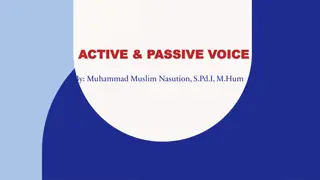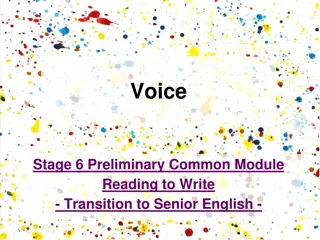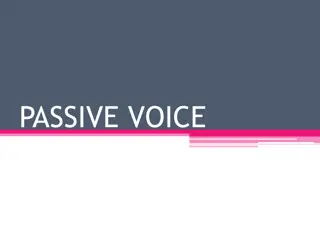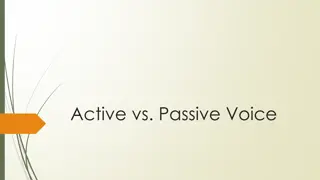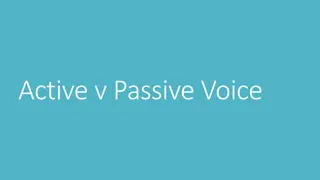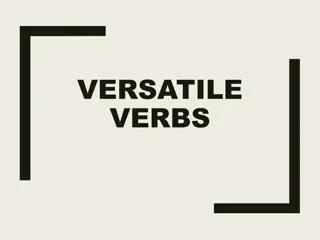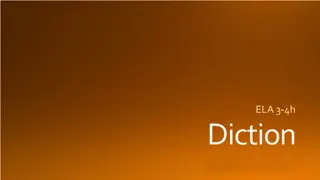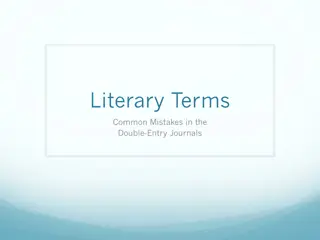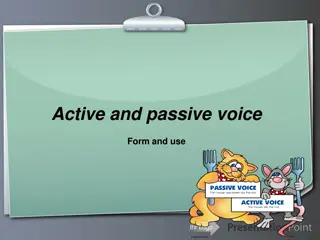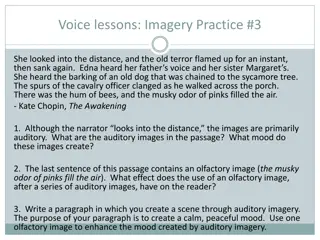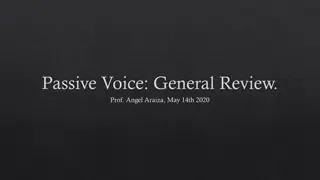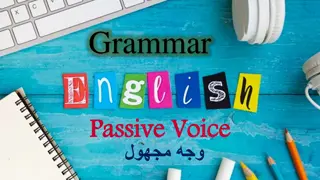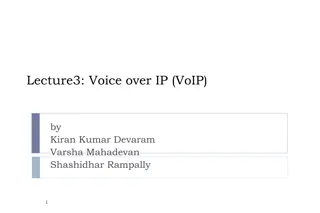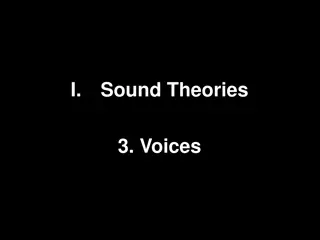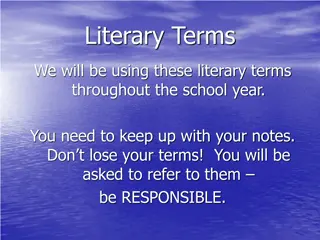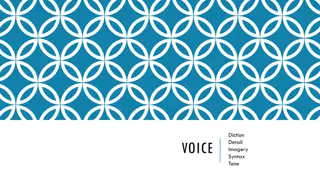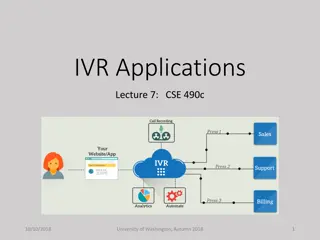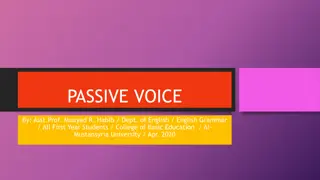Author's Style: Language, Diction, and Voice
Author's style encompasses various elements like syntax, diction, tone, and perspective. By analyzing how language is used, dialogue realism, sentence structure, tone, and word choice, one can determine the unique voice of the author. This guide explains how to identify and evaluate an author's style through language analysis.
Download Presentation

Please find below an Image/Link to download the presentation.
The content on the website is provided AS IS for your information and personal use only. It may not be sold, licensed, or shared on other websites without obtaining consent from the author.If you encounter any issues during the download, it is possible that the publisher has removed the file from their server.
You are allowed to download the files provided on this website for personal or commercial use, subject to the condition that they are used lawfully. All files are the property of their respective owners.
The content on the website is provided AS IS for your information and personal use only. It may not be sold, licensed, or shared on other websites without obtaining consent from the author.
E N D
Presentation Transcript
WHAT IS IT? Author s style is the particular way the writer uses language Author s style is the particular way the writer uses language - - Syntax (simple or complicated) Syntax (simple or complicated) - - Diction/Dialogue (types of words used Diction/Dialogue (types of words used - - Tone/Mood Tone/Mood - - Perspective/Point of View Perspective/Point of View - - Paragraph structure Paragraph structure - -Other literary elements Other literary elements Individualized use of style determines author s voice. Individualized use of style determines author s voice. - - An author s distinctive literary style, basic vision and An author s distinctive literary style, basic vision and general attitude toward the world. attitude toward the world. formal vs. informal) formal vs. informal) general
THINK OF IT THIS WAY When you hear the word When you hear the word style friends dress... friends dress... Or the way a baseball player swings a bat. Or the way a baseball player swings a bat. A person s style is created by how he/she does something A person s style is created by how he/she does something whether its selecting clothes or playing a sport. whether its selecting clothes or playing a sport. style, you may think of the way your , you may think of the way your
HOW TO DETERMINE STYLE Look at the way the author is using language in the text Look at the way the author is using language in the text - - Is the dialogue realistic? Is the dialogue realistic? - - Are the sentences short and conversational, or long and Are the sentences short and conversational, or long and complicated? complicated? - - Are the tone and mood lighthearted? If not, what are they? Are the tone and mood lighthearted? If not, what are they? - - How is the author/speaker delivering their message? How is the author/speaker delivering their message?
DICTION Diction is the choice and use of words and phrases in a piece of Diction is the choice and use of words and phrases in a piece of writing. writing. A writer s style comes from the choices he/she makes by A writer s style comes from the choices he/she makes by arranging words on a page. arranging words on a page. - - Should I use a long word, or a short word? Should I use a long word, or a short word? - - Do I want a simple sentence, or a long complex one? Do I want a simple sentence, or a long complex one? - - How is the writer encouraging understanding? How is the writer encouraging understanding? Examples: Examples: - - What type of diction will you use to convince your mom to What type of diction will you use to convince your mom to extend your weekend curfew? extend your weekend curfew?
FROM DICTION TO? How are they using their words in a piece of text? How are they using their words in a piece of text? What are their words implying What are their words implying How does their use of diction help us to understand the How does their use of diction help us to understand the tone/mood or a piece? tone/mood or a piece? Is their diction formal or informal? Is it effective? Is their diction formal or informal? Is it effective? - - What s the context? What s the context? - - Who s the audience? Who s the audience? - - What s the purpose? What s the purpose? - - Who s the speaker? Who s the speaker? CONNOTATION CONNOTATION
FROM DICTION TO? (EXAMPLE) Think about perspective, context, and how both affect the Think about perspective, context, and how both affect the speaker speaker - - Scenario: You are a reformed, former prisoner who You are a reformed, former prisoner who became a counselor and motivational speaker to help at became a counselor and motivational speaker to help at- - risk teenagers. When delivering your message, will you be risk teenagers. When delivering your message, will you be more formal or more informal? Why? more formal or more informal? Why? - - Anytime Anytime you live in the you live in the twentieth twentieth century, 1964, and you walkin walkin' around ' around here here singing We Shall Overcome, the singing We Shall Overcome, the government government has failed us. This is has failed us. This is part you you, you do too much singing. Today it s time to , you do too much singing. Today it s time to stop and and start swinging start swinging. . century, 1964, and you part of what s wrong with of what s wrong with stop singing singing
CONNOTATION AND DICTION Are Are there any heavy connotation words as I m reading? there any heavy connotation words as I m reading? (i.e. heavy suitcase?) (i.e. heavy suitcase?) - - Whether you are a Christian, Muslim, or nationalist, Whether you are a Christian, Muslim, or nationalist, we all have the same problem. They don t hang you we all have the same problem. They don t hang you because because you re a Baptist; they hang you 'cause you re you re a Baptist; they hang you 'cause you re black. black. (Note: What is emphasized and why?) (Note: What is emphasized and why?)
RECAP: TONE/MOOD What are they? What are they? What s the difference? What s the difference? Examples: Examples: - - Nina and her dad frolicked Nina and her dad frolicked on the playground. - - I ll drag you to court! Mr. Smith shouted. I ll drag you to court! Mr. Smith shouted. - - I speak as a victim of America s so I speak as a victim of America s so- -called democracy. on the playground. called democracy.
SYNTAX What is it? What is it? - - The way the author arranges words and phrases to create The way the author arranges words and phrases to create well well- -formed and effective sentences (i.e. how a writer puts formed and effective sentences (i.e. how a writer puts words and phrases together to effectively make their point) words and phrases together to effectively make their point) Pacing of the words and ideas Pacing of the words and ideas - - Think of sentence length Think of sentence length - - In order to slow down the pace, the author will use longer, more In order to slow down the pace, the author will use longer, more complicated sentences (e.g. textbooks, long novels, etc.) complicated sentences (e.g. textbooks, long novels, etc.) - - In order to quicken the pace, the author will use shorter, simpler In order to quicken the pace, the author will use shorter, simpler sentences. sentences. - - What was the pacing like for MLK s IHAD speech? What was the pacing like for MLK s IHAD speech?
LOOKING FOR SYNTAX Is what they re saying implicit or explicit? How do you know? Is what they re saying implicit or explicit? How do you know? How is the information being organized on the page? How is the information being organized on the page? - - Position: Position: where you put something in a sentence where you put something in a sentence - - Isolation: Isolation: setting it off by itself (dash, quotation marks, setting it off by itself (dash, quotation marks, parenthesis, etc.) parenthesis, etc.) a) I a) I speak as a victim of America s so speak as a victim of America s so- -called called democracy. democracy. - - Repetition Repetition: number of times something is repeated : number of times something is repeated - - Proportion Proportion: size or importance of the idea and how much of the : size or importance of the idea and how much of the piece the piece the idea takes up idea takes up These things are all done on purpose. Is it effective and how? These things are all done on purpose. Is it effective and how?
DISCOVERING SYNTAX Questions to ask yourself Questions to ask yourself - - Are the sentences simple and direct, or are they long and Are the sentences simple and direct, or are they long and complicated? complicated? - - Does the author ask rhetorical questions? Does the author ask rhetorical questions? - - Does the author use repetition for emphasis? Does the author use repetition for emphasis?
AUTHORS STYLE ASSESSMENT Read this passage and identify which statement on the next slide Read this passage and identify which statement on the next slide correctly describes its style correctly describes its style But what bothered him even more was when his father s eyes went But what bothered him even more was when his father s eyes went away. Usually it happened when it didn t cause any particular away. Usually it happened when it didn t cause any particular trouble. Sometimes during a meal his father s fork would stop trouble. Sometimes during a meal his father s fork would stop halfway to his mouth, just stop, and there would be a long pause halfway to his mouth, just stop, and there would be a long pause while the eyes went away, far away. while the eyes went away, far away.
AUTHORS STYLE ASSESSMENT (CONT.) Which statement correctly describes the passage s style? Which statement correctly describes the passage s style? Style 1 Style 1 The writer uses imagery and idioms to create a light tone about a The writer uses imagery and idioms to create a light tone about a serious subject. serious subject. Style 2 Style 2 Repetition and vivid imagery help show a young man s struggle to Repetition and vivid imagery help show a young man s struggle to understand his father. understand his father.
TOPIC SENTENCES What is it? What is it? Adventure Tourism Adventure Tourism Adventure Tourism is a different way for tourists to se New Adventure Tourism is a different way for tourists to se New Zealand. This type of tourism uses the plentiful natural resources Zealand. This type of tourism uses the plentiful natural resources mountains, rivers, lakes, wilderness areas and historical sites to provide mountains, rivers, lakes, wilderness areas and historical sites to provide adventure, thrills and challenges which are low risk but high excitement. For adventure, thrills and challenges which are low risk but high excitement. For example, the coastal areas in New Zealand are great for canoeing and example, the coastal areas in New Zealand are great for canoeing and kayaking. White kayaking. White- -water rafting is another popular water adventure. However, water rafting is another popular water adventure. However, if you would rather keep your feet on the ground, New Zealand has over 10 if you would rather keep your feet on the ground, New Zealand has over 10 developed walkways in addition to the tracks in the 12 National Parks. developed walkways in addition to the tracks in the 12 National Parks. Because more and more tourists are interested in learning about New Because more and more tourists are interested in learning about New Zealand by doing exciting and unusual activities, adventure tourism will Zealand by doing exciting and unusual activities, adventure tourism will continue to grow. continue to grow.
TOPIC SENTENCES (EXAMPLES) Time Management Time Management No matter how you slice it, there are only 24 hours in a day. To be No matter how you slice it, there are only 24 hours in a day. To be successful at university, students need to learn good time successful at university, students need to learn good time- -management skills. The first skill is not taking on more than you can handle. If you are skills. The first skill is not taking on more than you can handle. If you are working part working part- -time, have a family, and are involved in a community time, have a family, and are involved in a community organization, then taking a full course organization, then taking a full course- -load at college will be too much. Another time management skill is estimating the time required to perform Another time management skill is estimating the time required to perform tasks. For example, reading a hard chapter from a textbook cannot be done tasks. For example, reading a hard chapter from a textbook cannot be done quickly in between TV programs. Finally, actually quickly in between TV programs. Finally, actually doing done seems obvious, but it is a very difficult skill. You may find that cleaning done seems obvious, but it is a very difficult skill. You may find that cleaning out your closet is more important that starting or finishing that difficult out your closet is more important that starting or finishing that difficult essay for class. Procrastination is a time manager s enemy. By learning time essay for class. Procrastination is a time manager s enemy. By learning time management skills, your university will be successful and enjoyable. management skills, your university will be successful and enjoyable. management load at college will be too much. doing what needs to be what needs to be
TOPIC SENTENCES (EXAMPLES) Have Heart Have Heart The heart weighs about 11 ounces and is the size of a clenched fist. The heart weighs about 11 ounces and is the size of a clenched fist. The human heart performs at about 60 The human heart performs at about 60- -80 beats a minute. In a year it beats some 40 million times. At each beat it takes nearly a quarter it beats some 40 million times. At each beat it takes nearly a quarter of a pint of blood; in a single day it pumps 2,200 gallons of blood, of a pint of blood; in a single day it pumps 2,200 gallons of blood, and in the course of a lifetime about 56 million gallons. Is there any and in the course of a lifetime about 56 million gallons. Is there any other engine capable of carrying such a heavy work over such a long other engine capable of carrying such a heavy work over such a long period of time without needing to be repaired? Obviously the human period of time without needing to be repaired? Obviously the human heart is a small, yet highly efficient, piece of equipment. heart is a small, yet highly efficient, piece of equipment. 80 beats a minute. In a year


